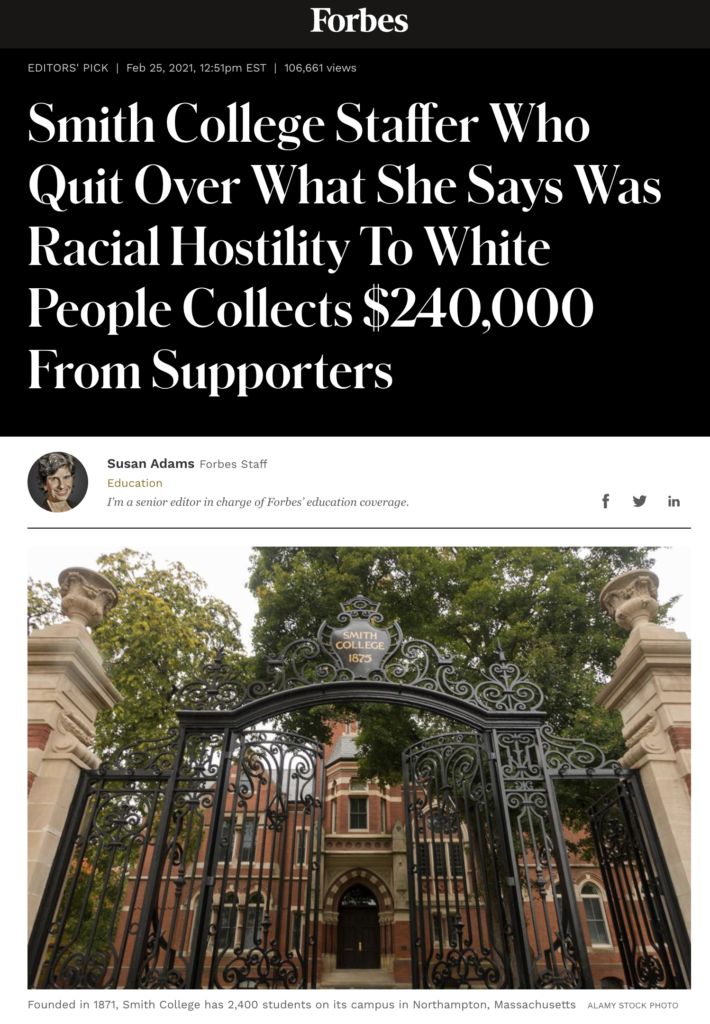
Taking issue with college cancel culture can be a money maker. Former Smith College staffer Jodi Shaw has raised more than $240,000 from a GoFundMe campaign in which she says she felt “trapped in a hostile work environment” at the elite women’s liberal arts school in western Massachusetts. In a video posted on her GoFundMe page she describes the “extreme intimidation we are all working under in regards to race.”
In a phone interview with Forbes, Shaw says she has hired lawyers and is planning to file a complaint with the Massachusetts Commission Against Discrimination. As her GofundMe page says, she is keeping $150,000 for herself and using the rest of the money she raises “to help others exercise their right to be free from a hostile work environment.” She says she’s already funding the cases of an aggrieved Smith staffer and a person who works at an Ivy League institution in New England who was falsely accused of racial bias. She declines to say whether they are white.
Many of her GoFundMe supporters appear to agree with increasingly politicized objections to diversity training. President Trump issued an executive order banning such training by federal agencies and contractors shortly before the election and President Biden reversed that order.
As of this writing, Shaw’s GoFundMe page has 345 comments. Michael Abare, who donated $20 yesterday, wrote: “Jodi, You are a modern hero and patriot! We need a few million more like you in order to turn back the 10% socialist thugs that are shoving this crap down our throats. Thanks for your bravery, morals and patriotism. Keep up the good work and God Bless You.”
Since Shaw resigned, her story has been covered by numerous outlets, including a page one story today in the New York Times. It recounts a July 2018 incident that Shaw says led to her dispute with superiors. A Smith employee called campus police to report on a Black student who was reading and eating lunch in a dormitory lounge reserved for a children’s summer camp. Before investigating the incident, the college required staffers to participate in trainings aimed at combatting systemic racism. (An inquiry later found that there was no racial motive behind the employee’s call to police.)
A “culture war” followed, according to Shaw. In August 2018, she says her supervisor told her she couldn’t present a library orientation for students in rap form because it could be viewed as cultural appropriation.
Later Shaw says she was “blown away” when a supervisor told her that to overcome tensions with a nonwhite coworker, “I had to remember the race, gender and city of origin of this person.” Shaw’s interpretation: “I was supposed to lower my expectations of my colleague’s ability to communicate.”
Instead of fighting racism, she says she felt Smith wanted her to perpetuate it. “I was being asked to engage in racial prejudice,” she says. “That felt dehumanizing.”
The “last straw” came in January 2020, she says, when she was required to participate in a three-day on-campus racial sensitivity retreat. When she refused to talk about her racial identity, she says the two retreat facilitators, who were Black, told her that she was demonstrating white fragility. “I felt humiliated,” she says.
In October 2020 she started posting videos to YouTube describing her dispute with Smith’s administration. She says she filed an internal complaint with Smith and asked that Smith take steps to change the “racially hostile environment.” After her bosses refused to comply with her requests, she resigned from her job last week and began posting about the dispute on Twitter and on her personal website. Bari Weiss, a former New York Times op ed editor, was the first to cover Shaw’s story in her Substack newsletter. Weiss’s post, headlined “Whistleblower at Smith College Resigns Over Racism,” encouraged readers to contribute to Shaw’s GoFundMe.